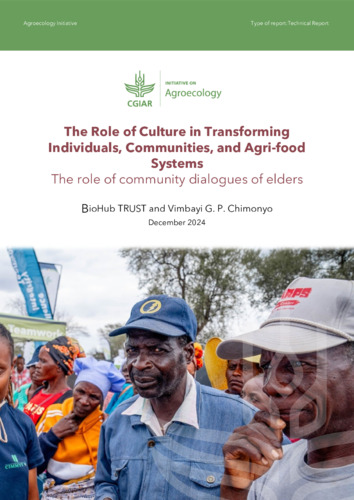The role of culture in transforming individuals, communities, and agrifood systems: the role of community dialogues of elders
Abstract
The Community Dialogue of Elders (CDE) was established under the Agroecology Initiative (AEI) in Zimbabwe to facilitate agroecological transformation by integrating Indigenous Knowledge Systems (IKS) with modern agroecological practices. Led by Biohub Trust in collaboration with CIMMYT, the Initiative aims to leverage the wealth of traditional knowledge possessed by elders, spiritual leaders, and local authorities to foster sustainable agricultural practices, promote social equity, and drive behavior change. The dialogues in Mbire and Murehwa districts focused on key themes such as traditional agricultural practices, governance of natural resources, gender inclusion, intergenerational knowledge transfer, human-wildlife conflict management, and integration of modern agroecological techniques. A carefully structured process was followed to establish the CDE, including stakeholder engagement, agenda-setting, and capacity-building efforts. Traditional leaders, spiritual figures, women, youth, and local government authorities were actively involved to ensure inclusivity and legitimacy. The dialogues emphasized the critical role of cultural practices in fostering ecological stewardship and social cohesion, highlighting rituals such as seed sanctification and rain-making as essential mechanisms for sustaining agroecosystems. The communication plan, developed to support these dialogues ensures that information flows effectively across different levels of governance and community structures. It emphasizes structured engagement, feedback loops, and capacity-building to enhance participation, motivation, and long-term behavior change. Traditional communication methods, complemented by modern tools, were used to disseminate information and gather feedback, ensuring cultural sensitivity and inclusiveness. The CDE aligns with the broader aspirations of the Agroecology Living Landscapes (ALLs) approach by promoting co-design and knowledge integration. The CDE fosters Trust and community buy-in by involving key opinion leaders such as elders and spiritual guides, which are critical for successful agroecological transformation. However, challenges remain, particularly in ensuring greater gender equity and addressing structural barriers faced by women and youth. The findings from the Vision to Action (V2A) report (Sibanda et al., 2024) underscore the importance of leveraging local actors and participatory processes to bridge these gaps and create a more inclusive food system. Key lessons from the CDE process highlight the importance of cultural relevance, stakeholder ownership, and intergenerational knowledge transfer in driving sustainable change. Integrating traditional and modern knowledge systems, policy support, and resource allocation presents an opportunity to scale the Initiative across other communities. The CDE offers a model for promoting socially inclusive, culturally grounded agroecological transitions in Zimbabwe by institutionalizing the dialogues and fostering partnerships between local leaders and government authorities.

